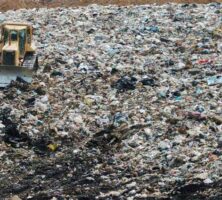The Resource Conservation and Recovery Act (RCRA) is a federal law that describes how to handle solid and hazardous waste in the United States. Subtitle D of RCRA specifically concerns the management of nonhazardous solid waste. Waste disposal is an important issue for citizens in all states, including Georgia, because poor waste management can have negative effects on both the environment and human health. Subtitle D is implemented in Georgia by the Department of Community Affairs (DCA) and the Environmental Protection Division (EPD) of the Georgia Department of Natural Resources.
Solid Waste in Georgia
The term solid waste includes regular household garbage (known as “municipal solid waste”), as well as sludge from waste treatment plants, nonhazardous industrial waste, construction debris, agricultural waste, mining waste, and many other discarded materials. Although Subtitle D regulates a variety of waste types, the majority is classified as municipal solid waste.

Courtesy of Atlanta Journal-Constitution.
In 2008 a total of 16.3 million tons of solid waste were disposed of in Georgia. On average, each person in Georgia generated 6.07 pounds of waste per day in that year. About 22 percent of this waste went to construction and demolition landfills; to Georgia’s only incinerator, located in Chatham County; or to the state’s only large-scale composting facility, located in Cobb County. A small portion of the waste, just 1 percent, went to unlined landfills still operating in Georgia under permits established before Subtitle D was enacted. The remaining 76 percent entered lined, monitored landfills that meet Subtitle D regulations. These standards, established by the U.S. Environmental Protection Agency, include the use of landfill liners and groundwater monitoring wells, and the daily compacting and covering of waste. Subtitle D landfill regulations are intended to prevent the waste from contaminating the soil or water around the landfill.
In Georgia the DCA and the EPD work together to properly manage and reduce solid waste in the state. The DCA educates the public through such programs as Keep Georgia Beautiful, which supports education about waste management and reduction, and compiles reports about solid-waste management activities in the state. The EPD’s Solid Waste Management Program issues permits for solid-waste handling facilities, inspects these facilities, and issues surface-mining permits.
Land Disposal Capacity
Some states in other parts of the country are running out of room for the safe disposal of their solid waste. This situation can make solid-waste disposal very costly, because the waste must be shipped long distances to be properly handled. As of 2009 Georgia has 26.6 years of remaining permitted municipal solid-waste disposal capacity. This capacity is not evenly distributed throughout the state, however. Counties in coastal and northeast Georgia are estimated to have less than 10 years of remaining landfill capacity. To avoid running out of landfill space, Georgians will need to limit the amount of waste that is disposed of each year. In 2008 the amount of waste sent to solid-waste landfills fell for the first time in more than a decade.
Alternative Solid Waste Management
Methods other than landfill disposal are used to manage some types of solid waste. Yard trimmings are collected and disposed of without entering into typical municipal solid-waste landfills. Larger yard wastes, such as cut branches or old Christmas trees, are often chipped and used as mulch. In Georgia the number of local governments that provide mulching service increased from 291 in 2006 to 349 in 2008.
Another important component of solid-waste management in Georgia is recycling programs. Recycling such products as paper, glass, aluminum, and plastic not only reduces the amount of waste going into landfills but also preserves natural resources and cuts down on energy use. The sale of recyclable materials can also serve as a way for local governments to make money. In 2008 there were 401 local governments in Georgia that provided recycling services to their residents, and more governments are offering these services each year.
Georgia faces many challenges regarding solid-waste management. The state’s current trends of decreased per capita waste production, increased recycling, and increased adherence to RCRA standards for landfills are all encouraging signs that Georgians will be able to meet these challenges successfully.





